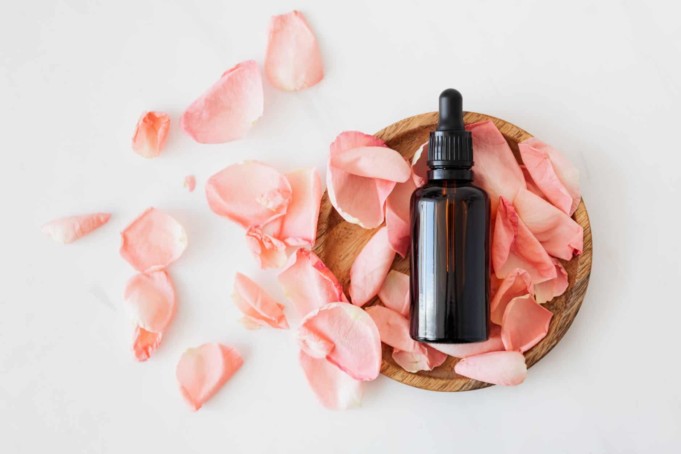Over the last few years, essential oils have witnessed an increase in popularity and usage. Brands like doTERRA, NOW Foods, Plant Therapy, and Young Living, and more tout properties like anti anxiety, antimicrobial, anti-inflammatory, antioxidant, immune-boosting, stress-reducing, sleep-inducing.
One of the fascinating purported benefits of essential oils is their ability to help with weight loss. They are believed to boost your diet and exercise regime, energise you for workouts, and possibly reduce food cravings. Is all of this true?
What’s essential oil?
Essential oil is a natural substance derived from a single plant species, usually through some kind of distillation (using steam and water). Some companies employ mechanical methods like cold pressing to extract their oils.
According to the National Association for Holistic Aromatherapy, “essential oil” is coined from the original name “quintessential oil, ” which referred to the notion that distillation was a process of extracting the spirit from the plant.
Many religions believe that Quintessence, or life force, or spirit is the fifth element of the world. It’s also been called aether, akasha amongst others.
The oils capture the flavour and aroma of the plant from which they are extracted. Essential oils are seen as a natural alternative to medications as they are (usually) left in the purest form possible. They are most often used in massage therapy and aromatherapy.
Benefits
While still in the plants, essential oils protect the plant against fungi and bacteria, attract pollinators, defend against insects, and help in allelopathy (relating to the production of biochemicals by an organism.)
While in humans, they are said to possess the following benefits and properties:
- Antibacterial
- Antimicrobial
- Antioxidant
- Antiviral
- Digestive health
- Sedative
- Mood-boosting
- Stress relief
- Libido-enhancing
- Calming effect
- increased focus
- Weight loss
- Relief from skin conditions, headache, nausea
- Energy boosting
- Reducing muscle soreness and boosting athletic performance
Types of oils
- Eucalyptus: protecting against insect bite; relieve coughing, headache, and asthma.
- Bergamot: anti-anxiety properties
- Lemongrass: relieving anxiety, common cold, fevers, musculoskeletal pain, and sleeplessness.
- Tea tree: treating acne
- Chamomile: assisting in relaxation
- Fractionated coconut: helping with fat loss
- Lavender: anti-inflammatory and antioxidant properties, sedative and soothing properties
- Bitter orange: improves athletic performance, relieving indigestion and more
- Peppermint: relieving headache, indigestion, menstrual cramps, and sinus issues.
Safety
Is it safe to consume essential oils? Yes and no. Some essential oils are safe to ingest and some that are not safe. Other factors that determine whether an essential oil is safe to consume include quality, potency and personal sensitivities.
Most research on essential oils ingestion was carried out on animals – not humans – so there’s no real consensus as to whether or not we should be ingesting these products yet. However, what we do know is that the safest method of taking essential oils is as part of a vegetable or gelatin capsule.
This assists in preventing irritation to the intestinal mucosa (the lining that safeguards our digestive tract). You stand a risk of severe digestive discomfort among other symptoms if you consume essential oils without researching the safety beforehand.
Most high-quality essential oils aren’t harmful when ingested in the recommended way (within a capsule) or diluted with water. You have to think about the quality of the oils you choose to ingest.
Many essential oils may contain harmful substances such as solvents, dilutors, or other additives. Please don’t swallow if you’re not sure of the content of your essential oils.
It’s essential that you carry out your own research on your product as there are little government regulations on essential oils. Even some products that claim to be pure might still contain remnants of pesticides or might have been distilled through faulty methods.
Essential oils that are safe to consume
There is a list of “safe essential oils” approved by the FDA. These oils are safe to consume when diluted or within a capsule. In fact, the capsule version of peppermint oil is even linked to alleviation of symptoms in people with irritable bowel syndrome.
Essential Oils you should never consume
Oils like arborvitae, birch, cedarwood, cypress, eucalyptus, wintergreen, and white fur are not recommended for ingestion.
Consuming these oils can cause symptoms of toxicity such as cough and gagging, drowsiness, shallow breathing, nausea, vomiting shortness of breath and (in some cases) diarrhea.
If by accident you do consume one of these oils, you should rinse out your mouth immediately and contact a poison control/medical centre nearest to you.
Essential oils for weight loss
With more than 90 essential oils on the market, a few may help with weight loss. It’s essential to note that no essential oil has been proven to lead to weight loss directly.
Instead, their distinctive qualities provide benefits that may extend to your weight loss efforts.
Relief from aches and pain, a better mood, improved digestion, better sleep and boosted energy levels are all essential oils benefits that might have a positive impact on your weight loss.
More studies need to be carried out to know the real efficacy of essential oils in humans, but the little evidence we have so far is promising.
- Juniper has been linked with antioxidant, antidiabetic and antiobesity properties.
- Ginger supplements have led to positive changes in lipid profile, body weight and insulin resistance in animals.
- Garlic has been known to possess a lot of protective properties, including resistance to weight gain. In an animal study, garlic essential oil was discovered to protect mice from obesity, inflammation, hyperlipidemia, and more.
- Lemongrass, peppermint and others may help in digestive processes.
- Bergamot and others may help due to their stress-reducing qualities.
How to use oils?
As earlier mentioned, ingesting essential oils may not be the best method to achieve weight loss (or any other health goal) due to safety considerations. However, topical application and diffusion are two effective ways that may help.
By topically applying or diffusing essential oils, you can gain some of the benefits that promote weight loss. For instance, using lavender on your skin at night may result in a better night sleep, which in turn can give you more motivation and energy for your morning run.
Good quality sleep has been related to making better food choices during the day. If applied topically, you should dilute your essential oils to avoid skin reactions like burning or redness.
Combining essential oils with massage may even encourage further weight loss. The benefits of both together can appreciably impact your range of motion, mood, focus, sleep and the way your body feels – all of which are crucial elements in your decision to eat nutritious foods and work out.
Bottom line
While including essential oils to your healthy lifestyle can be a good idea, their sole function isn’t and shouldn’t be weight loss.
Instead, focus on proven methods such as healthy eating and exercise to lose weight, and use essential oils as supplements to help with stress, sleep, or other factors that may be hindering your weight loss progress.
If you do want to introduce essential oils into your weight loss program, you should speak with your doctor first or any other medical professional.












